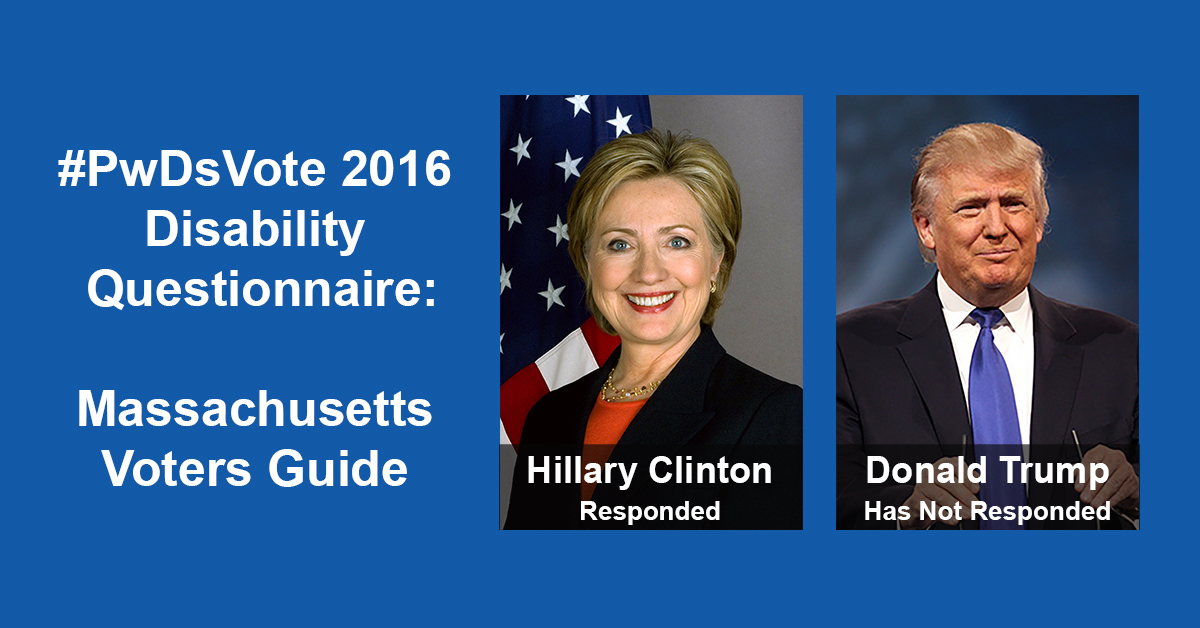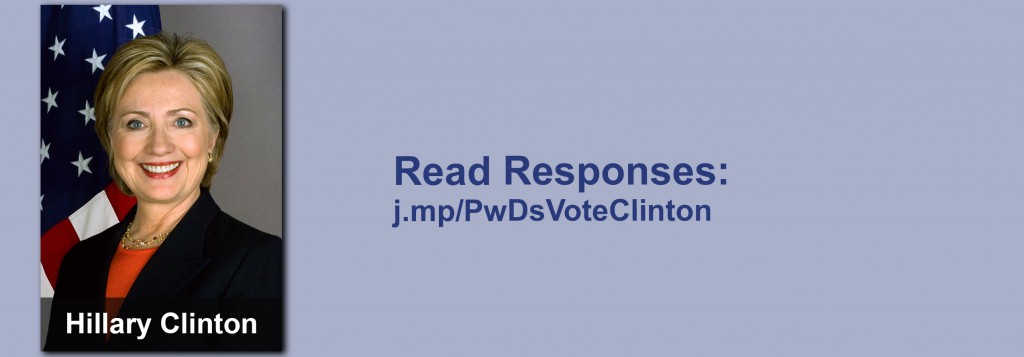Washington, Oct. 14 – As voters get ready to head to the polls in Massachusetts, RespectAbility releasing its Massachusetts Disability Voter Guide for the upcoming presidential election. Democrat Hillary Clinton has completed the #PwDsVote Disability Campaign Questionnaire, but Republican Donald Trump has yet to do so.
The #PwDsVote 2016 Campaign Questionnaire was designed by and for people with disabilities (PwDs) and those who love them to know where candidates stand on key issues. RespectAbility is nonpartisan and does not endorse candidates. The questionnaire is purely for educational purposes as voters go to the polls.
According to a new report from Rutgers University, 35.4 million people with disabilities will be eligible to vote in the November 2016 elections, representing close to one-sixth of the total electorate. That’s an increase of nearly 11 percent since 2008.
The presidential questionnaire was created during the primary season and asked all of the presidential candidates to comment on 16 disability questions. Former Secretary of State Hillary Clinton responded by addressing all of the questions. Despite numerous requests in person and by phone and email, the Trump campaign has not yet filled out the questionnaire. The American Association of People with Disabilities and the National Council on Independent Living also has a nonpartisan presidential questionnaire, which both Clinton and Trump have completed. Libertarian Gary Johnson and Green Party candidate Jill Stein have not filled out either questionnaire.
Twenty-three candidates for Senate, as well as nine candidates for governor, from both sides of the aisle (19 Democrats, 13 Republicans) also completed the down ballot questionnaire, showing that disability rights is a nonpartisan issue. The responses also are geographically-diverse, coming from states all around the country, as politicians are paying more and more attention to the disability community.
Massachusetts Needs to Improve Outcomes for Citizens with Disabilities
While Massachusetts has done some important strategic work on employment for people with disabilities under the leadership of Gov. Charles Baker, it can and must do better in terms of competitive, integrated employment for people with disabilities. Of the 399,206 working-age people with disabilities in Massachusetts, only 35.5 percent are employed. Further, there are approximately 29,000 youth with disabilities between the ages of 16 and 20. Each year a quarter of them will age out of school into an uncertain future.
Fortunately, the Commonwealth has already taken significant steps to end the policies that left far too many people trapped in sheltered workshops. These efforts, combined with the strategic opportunities offered by the Workforce Innovation and Opportunity Act (WIOA), mean that Massachusetts can invest heavily into improving the competitive, integrated employment outcomes for its citizens with disabilities. After all, there remains a staggering 43.5 percentage point gap in the labor force participation rates (LFPR) between people with and without disabilities. This gap will not be closed unless resources are committed to best practices and cost-effective models.
Massachusetts’ voters are looking to know where the candidates stand on important disability issues in order to increase opportunities for competitive, integrated employment for people with disabilities and foster a more inclusive society. As such, RespectAbility has actively encouraged politicians to include issues facing people with disabilities in their policy agendas. Founded in 2013, RespectAbility is a nonpartisan, nonprofit organization working to end stigmas and advance opportunities for people with disabilities.
America has 1.2 million youth with disabilities between the ages of 16 and 20. Each year 300,000 of them age into what should be the workforce, but stigmas and lack of knowledge about the capabilities of people with disabilities means that most do not find employers willing to hire them. Young adults with disabilities in all of these states are hoping to find work. They have high expectations and deserve the opportunity to achieve the American dream. Young people with disabilities may simply need some thoughtful help to transition into the workforce. See data on all 50 states here: State Data.
In order to promote best practices and the inclusion of people with disabilities in state workforce systems, RespectAbility has submitted comments for all 50 state’s drafts of the Unified Plan, which is required under Section 102 of WIOA. This new law represents the intersection of hope and history for people with disabilities.
The Commonwealth has been at the forefront of many our nation’s greatest progressive challenges in terms of inclusion, opportunity, and diversity. However, the Commonwealth has not yet fully achieved the high outcomes and improved employment opportunities that its citizens with disabilities want and need. Such poor outcomes cause a needless school to prison and/or poverty pipeline. Failing to properly train and prepare job seekers with disabilities costs the Commonwealth’s economy incredible talent and shatters the aspirations of so many Bay Staters with disabilities who want to pursue the American Dream, just like everyone else. We remain concerned with some of what we have seen in the Combined State Plan, but are optimistic that voters will continue to encourage politicians to include people with disabilities and the issues we face in their political agendas.
Fully one-out-of-five Americans have a disability, and 52 percent of likely voters have a loved one with a disability. Only 34 percent of working-age Americans with disabilities have jobs, despite the fact that the vast majority want to work. More than 11 million working age people with disabilities are now living on government benefits in our country.
RespectAbility President Jennifer Laszlo Mizrahi said, “Our community is looking for jobs so we can achieve the American dream, just like anyone else. It is vital for us to know where the candidates stand on economic, stigma, education, safety, transportation, housing, healthcare, foreign affairs and other issues.”
Remember to Vote
Massachusetts residents can vote for the candidates of their choice either through the standard voting schedule or through early voting. The registration deadline is Oct. 19, 2016. You may register online, in person or by mail. For more information on registration: Massachusetts Voter Registration.
Residents may vote early from Oct. 24, 2016 through Nov. 4, 2016. For more information, contact your local election official. Residents may also vote absentee. In order to be eligible to vote by absentee ballot in Massachusetts, a voter must be prevented from voting at their polling place on Election Day, due to: Absence from the voter’s city or town on Election Day; Physical disability; or Religious belief. Absentee ballots must be requested in writing by either the voter or the voter’s family member. All requests for absentee ballots must be received by your local election official no later than 12:00 p.m. on Nov. 7. For more information: Absentee Voting in Massachusetts.





Be First to Comment